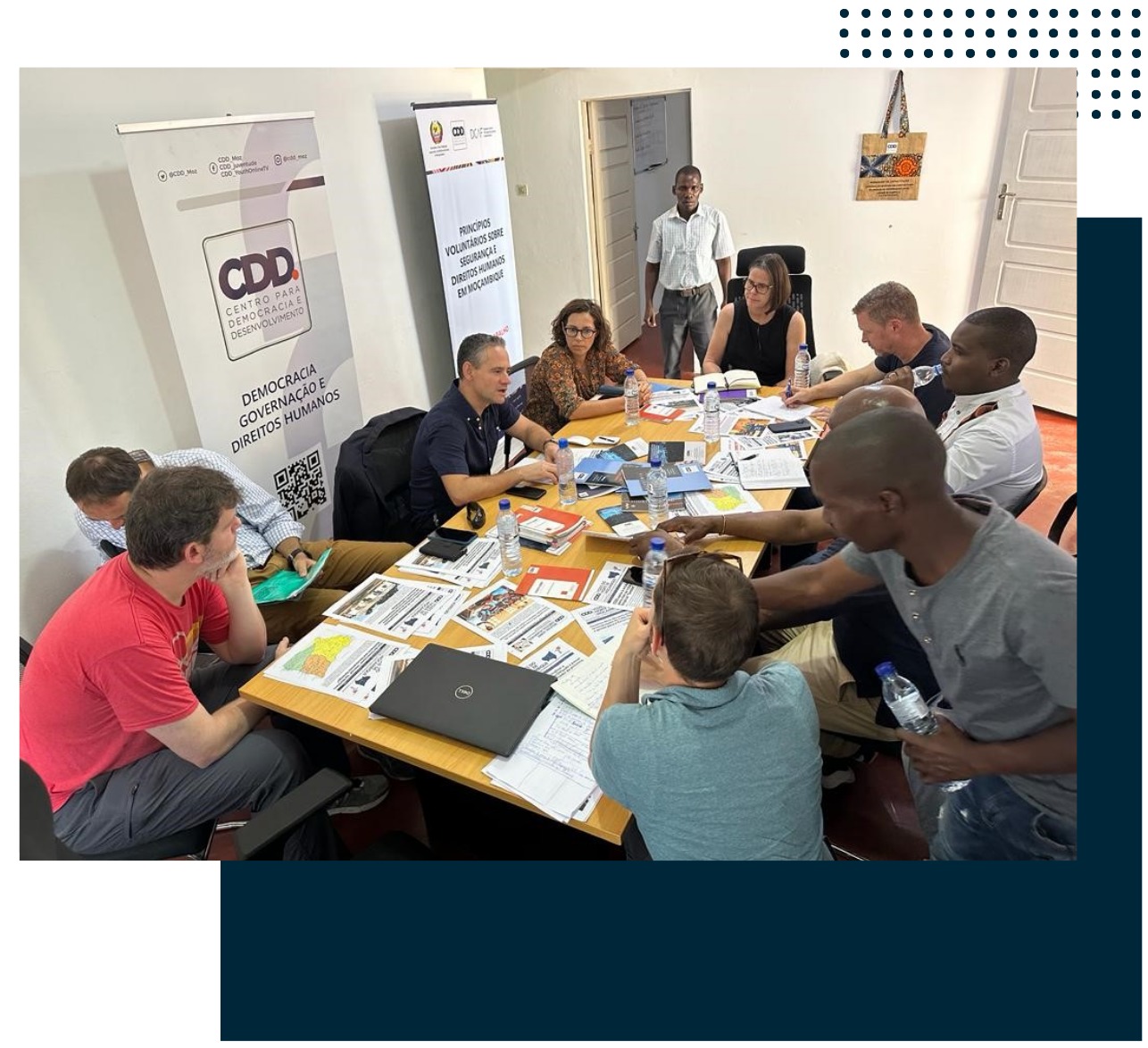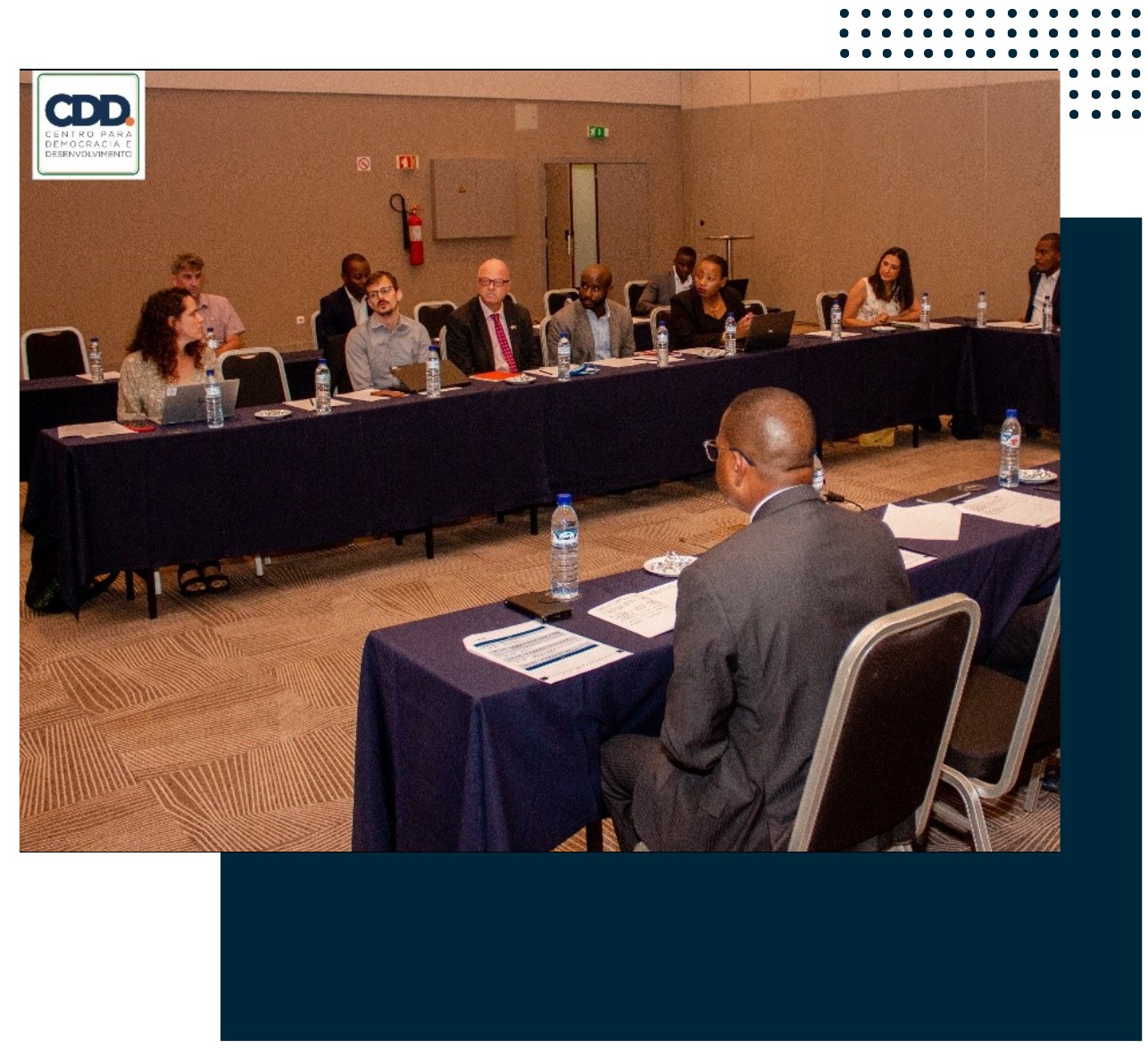THE CENTRE FOR DEMOCRACY AND HUMAN RIGHTS – CSO PROFILE
The Centre for Democracy and Human Rights: A Mozambican Pillar for Community Values in The World of Private Security
ICoCA CSO Member since August 2023
Advancing Democracy, Human Rights, and Good Governance in Mozambique
Established in 2018, the Centre for Democracy and Human Rights (CDD) is an organisation headquartered in Maputo, Mozambique, with additional offices in Cabo Delgado, Niassa, Nampula, and Gaza. Despite its relatively small team of about 25 members, the organisation’s efforts are not limited to any specific region; instead, it strives to make a positive impact by upholding democratic principles and human rights standards throughout Mozambique. CDD’s presence in multiple regions of Mozambique empowers it to efficiently tackle local issues and interact with communities across the country. This operational footprint therefore allows individuals at the local level to actively engage with key institutions, enabling their effective participation in governance.
CDD is an organisation that sits at the intersection between research for action and advocacy. At the heart of CDD’s operations is the commitment to promote and safeguard the fundamental rights and freedoms of all individuals in Mozambique. Their primary focus on human rights advocacy includes defending justice, equality, and dignity for everyone. However, their dedication to creating a more just and equitable society goes beyond human rights advocacy alone. CDD recognises the vital role of good governance in achieving their goals. Therefore, in addition to human rights advocacy, CDD actively promotes good governance practices. “We believe that effective governance is essential for creating an environment in which human rights can flourish”, explains Prof. Adriano Nuvunga, Director of CDD.
CDD’s Multifaceted Commitment: From Human Rights Advocacy to Peace and Security
In addition to its primary focus on human rights advocacy, CDD prioritises addressing a diverse range of critical areas that play a pivotal role in society’s well-being. These areas encompass peace and security, monitoring of private military companies as well as private security companies, business and human rights affairs, upholding democracy, community development, energy transitions and youth empowerment.
In a world grappling with environmental challenges, advocating for sustainable energy solutions is essential to minimise further damage. Therefore, CDD’s efforts are centered on promoting clean and renewable energy sources that are both environmentally friendly and socially equitable. The organisation also believes that sustainable development is closely intertwined with human rights and social justice. CDD is deeply involved in community development projects aimed at improving the living conditions and overall well-being of marginalised communities. Additionally, CDD strives to “create opportunities for young people to engage in civic activities and contribute to positive change in their communities, as youth play a critical role in shaping the future of our nation”.
Within the realm of business and human rights, CDD plays a pivotal role in promoting responsible corporate practices. Their efforts include advocacy, monitoring, and engagement in public and private sectors to ensure that businesses respect human rights, adhere to ethical principles, and contribute positively to local communities. CDD actively supports democratic principles and human rights, advocating for their integration into security operations and striving for transparency and accountability at all government levels. A testimony of their engagement is their participation in initiatives such as the Voluntary Principles on Security and Human Rights.
Going further in their commitment, CDD actively engages in initiatives related to peace and security, and collaborates closely with organisations like Preventing and Countering Violent Extremism (PCVT) to mitigate root causes of extremism and promote community resilience. Additionally, CDD recognises the importance of responsible and ethical conduct in private military companies, as well as the need to regulate private security companies. CDD actively advocates for the monitoring of their activities to ensure compliance with international human rights standards. Their goal is to enhance accountability and transparency within this sector to prevent future abuses and safeguard human rights.
“We are committed to developing and enforcing ethical standards for these companies, ensuring that they operate in a manner that respects human rights, fosters community trust, and enhances overall security”, adds Mr. Nuvunga.
Improving Responsible Private Security Advocacy Through ICoCA Membership
Given its core mission to advocate for accountable democratic governance that serves all citizens, including marginalised and vulnerable communities, it is only natural that CDD joined ICoCA in August 2023. According to Mr. Nuvunga, joining ICoCA aligned perfectly with CDD’s commitment to promoting responsible and ethical practices within the private security sector, which plays a crucial role in ensuring the safety and protection of individuals and communities.
 By becoming a Member of ICoCA, the organisation seeks to enhance its capacity and effectiveness in promoting accountable private security service provision. “Through our membership, we can access valuable resources, tools, and expertise offered by ICoCA, enabling us to improve our knowledge and practices in this field”, explains Mr. Nuvunga.
By becoming a Member of ICoCA, the organisation seeks to enhance its capacity and effectiveness in promoting accountable private security service provision. “Through our membership, we can access valuable resources, tools, and expertise offered by ICoCA, enabling us to improve our knowledge and practices in this field”, explains Mr. Nuvunga.
Furthermore, CDD believes that collaboration and partnerships are key to addressing complex challenges. They see ICoCA as an opportunity for them to engage with a global network of stakeholders committed to responsible private security practices. By working alongside other members, they expect to share experiences, exchange best practices, and collectively contribute to the advancement of ethical standards in the private security industry.
Having joined the Association only recently, CDD hasn’t launched any joint project with ICoCA yet, but they anticipate working together on matters related to private security in Cabo Delgado, Mozambique.
Navigating Challenges and Opportunities: CDD’s Perspective on ICoCA’s Future
CDD acknowledges several significant challenges as it looks ahead. With evolving security dynamics, changing conflict patterns, and emerging technologies impacting private security companies’ operations, the operating environment in the private security industry becomes increasingly complex to navigate. Adapting to these changes while upholding ethical and responsible conduct remains a challenge.
Mr. Nuvunga believes that ICoCA’s biggest challenge will be maintaining consistent standards and oversight across a diverse range of regions and industries as the Association expands its membership and reach. Lastly, he adds that resource constraints also pose difficulties in securing sustainable funding for ICoCA’s essential activities like monitoring, reporting, and capacity-building.
Despite these challenges, CDD sees the next decade as an opportunity for ICoCA to enhance its relevance in conflict zones, disaster response, and other sensitive environments where private security companies are playing an increasingly prominent role. By expanding its capacity-building efforts and providing training and guidance, ICoCA could improve compliance and contribute to a more responsible private security industry, in Mr. Nuvunga’s opinion.
Furthermore, CDD suggests that ICoCA should continue to invest further efforts in maintaining ongoing engagement in partnerships and dialogue with governments, international organisations, and civil society organisations. They also believe that emphasizing transparency and accountability within the Association and among its Members represents another opportunity to enhance credibility and trust. “Robust reporting mechanisms and clear accountability structures can further the goals of the Code of Conduct”, comments Mr. Nuvunga.
To learn more about the Centre for Democracy and Human Rights visit their website.
